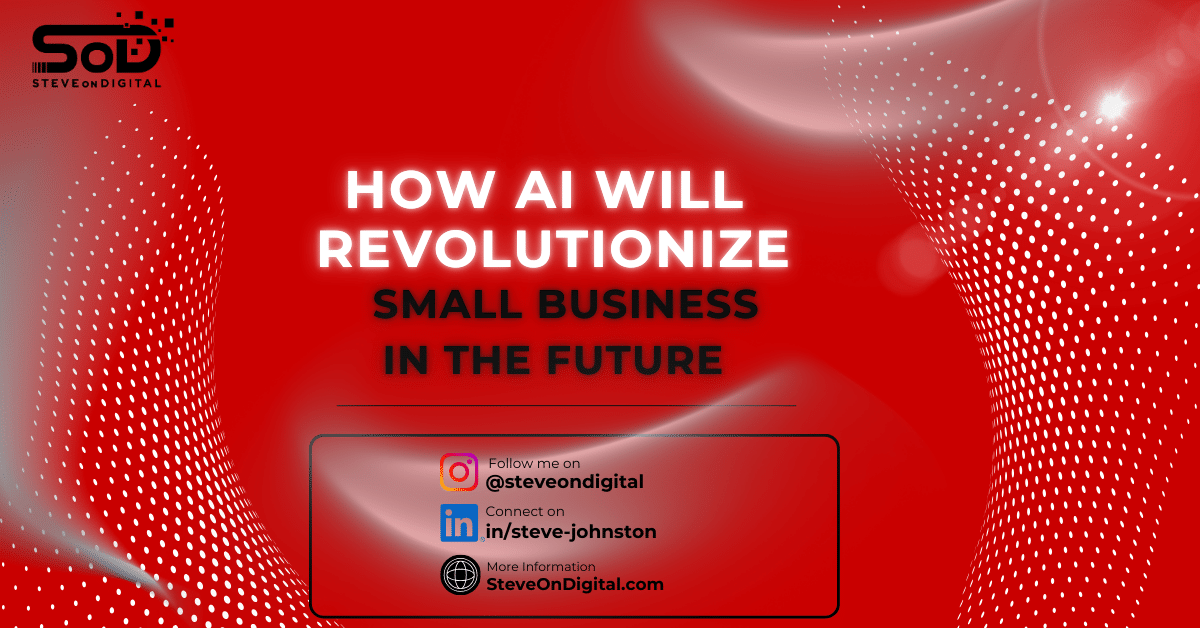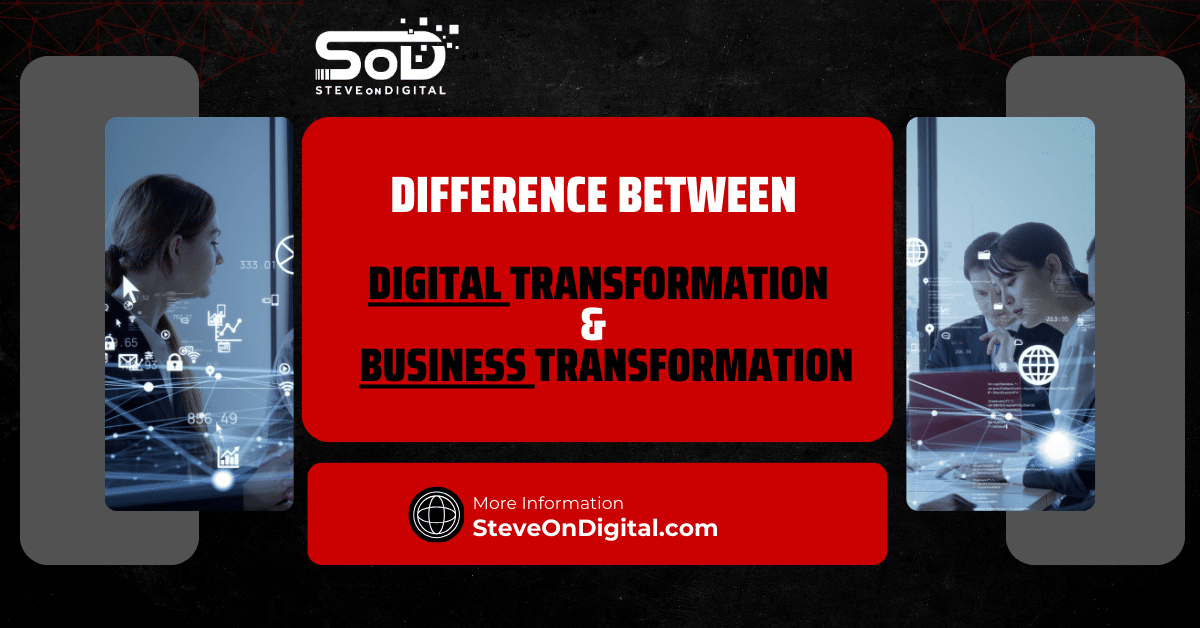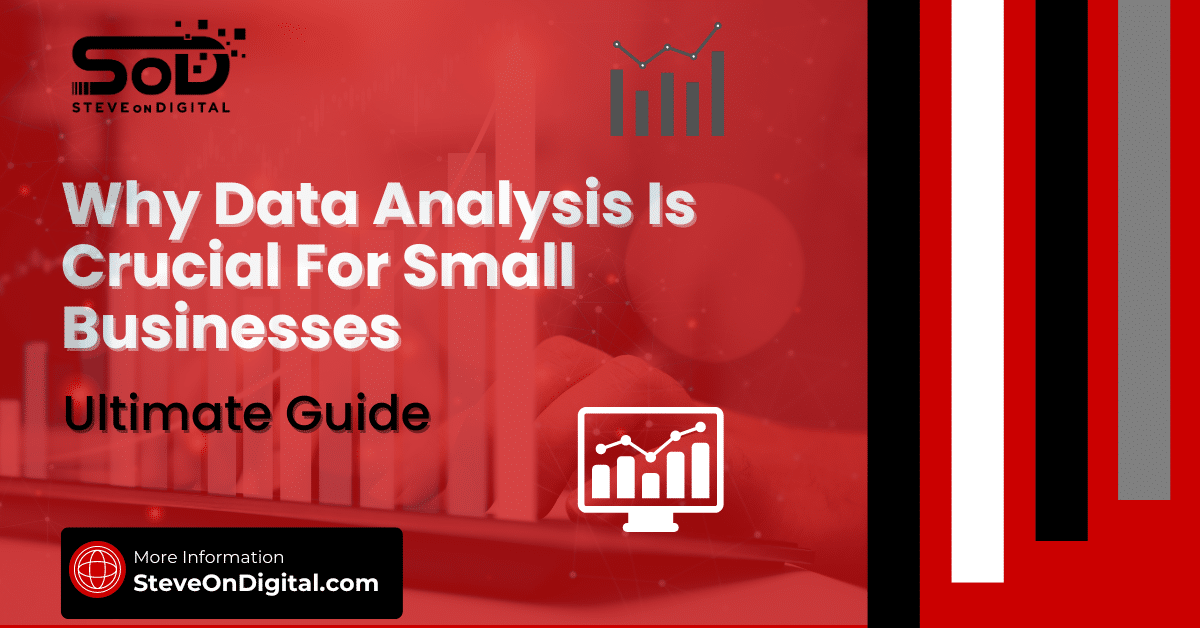AI will revolutionize small businesses by automating tasks, enhancing customer service, and driving data-driven decisions. It allows small businesses to streamline operations, improve efficiency, and gain a competitive edge in a rapidly evolving market. As AI technology continues to advance, it’s becoming an essential tool for business owners to stay competitive and succeed.
Artificial Intelligence is no longer just for big corporations. I’ve seen firsthand how AI tools can transform small businesses by optimizing marketing strategies, improving customer engagement, and providing insights that were once out of reach. This blog explores how embracing AI can drive future success for small businesses.
I’m Steve, a digital transformation expert with a strong background in electrical engineering, an MBA, and a master’s in Project Management. I excel at helping SMEs navigate the digital landscape with practical insights. Let’s begin!
The Evolution of AI Technology
AI technology has come a long way, from simple automation tools to sophisticated systems that can learn and adapt. The rapid growth and development of AI mean that what was once only accessible to large corporations is now within reach for small businesses. This section dives into how AI technology has evolved and why it’s more relevant than ever for small businesses to integrate these advancements into their operations.
AI Technology Continues to Advance
AI is constantly evolving, with new developments in machine learning and natural language processing. These advancements have significant implications for small businesses. For instance, AI can now handle complex tasks that require understanding and responding to human language, like customer inquiries. This means small businesses can provide 24/7 customer support without the need for a large team. Moreover, AI’s ability to learn from data means it can continually improve its performance, making it an invaluable tool for any small business looking to stay competitive.
AI Innovations in Multiple Industries
AI is not just for tech companies; it’s being adopted across multiple industries, from retail to healthcare. These innovations can be adapted for small business operations, helping to improve efficiency and reduce costs. For example, AI-driven inventory management systems are helping small retailers optimize stock levels, reducing waste, and ensuring that they always have the right products available for their customers. In healthcare, small practices are using AI to streamline patient scheduling and automate routine tasks, freeing up time for more critical activities.
AI Tools and Solutions for Small Businesses
The AI tools available today are powerful and accessible, designed to help small businesses enhance efficiency, improve customer service, and gain a competitive edge. I’ve explored and implemented several of these tools in my own business, and the results have been nothing short of transformative. This section provides an in-depth look at the AI tools and solutions that small businesses can use to stay ahead of the curve.
AI-Driven Solutions
AI-driven solutions are designed to streamline operations and improve decision-making processes. For instance, AI algorithms can sift through extensive customer data to uncover trends and patterns that might not be immediately noticeable. This data-driven decision-making process allows small businesses to make informed choices that can significantly impact their bottom line. Additionally, AI can help small businesses automate routine tasks, such as processing orders or managing customer inquiries, freeing up time for more strategic activities.
Automating Routine Tasks
One of the most significant advantages of AI is its ability to automate routine tasks. For small business owners like me, time is always in short supply. Automating tasks like data entry, invoicing, or even social media management can save countless hours each week. AI tools can handle these tasks efficiently and accurately, reducing the risk of human error and allowing you to focus on growing your business.
AI-Based Systems for Small Businesses
AI-based systems are specifically designed for small businesses to optimize their operations. These systems can range from customer relationship management (CRM) tools that help you manage customer interactions to AI-powered chatbots that provide instant customer support. By integrating these systems into your business, you can improve efficiency, enhance customer service, and ultimately increase your profitability.
Leveraging AI for Customer Experience Enhancement
Customer experience is at the heart of any successful business, and AI has the potential to revolutionize how small businesses interact with their customers. From personalizing marketing messages to providing instant support, AI can help you enhance your customer experience in ways that were previously unimaginable.
Enhancing Customer Service with AI
Customer service is one area where AI truly shines. With AI tools, small businesses can provide quick, accurate responses to customer inquiries, no matter the time of day. For example, AI-powered chatbots can handle common customer questions, such as product availability or order status, freeing up your team to focus on more complex issues. In my experience, implementing AI in customer service has not only improved customer satisfaction but also reduced the workload for my team.
Personalized Customer Experience
AI can also help small businesses provide a more personalized customer experience. By analyzing customer data, AI tools can identify individual preferences and behaviors, allowing you to tailor your marketing messages and product recommendations to each customer. This level of personalization can lead to higher customer satisfaction and increased loyalty, which are crucial for the long-term success of any small business.
AI in Marketing Strategies
Artificial intelligence (AI) is changing the way small businesses approach marketing. With the power to analyze vast amounts of data, AI helps small businesses create more personalized, effective marketing strategies. Over the years, I’ve learned that the success of a marketing campaign often hinges on understanding your audience and delivering the right message at the right time. AI makes this possible by offering tools that can predict customer behavior and segment audiences more precisely than ever before.
Personalized Marketing with AI
One of the most significant advantages of AI in marketing is its ability to deliver personalized messages to different customer segments. AI tools can analyze customer data, such as purchase history and browsing behavior, to create highly targeted marketing campaigns. For example, I’ve seen small businesses use AI to send personalized email offers to customers who are likely to be interested in specific products based on their past interactions. This not only increases the chances of a sale but also enhances customer satisfaction by showing that you understand their needs.
AI-Driven Marketing Efforts
AI-driven marketing goes beyond just personalizing content; it also helps predict market trends and analyze consumer behavior. I’ve found that using AI to track how customers interact with your brand across different channels can provide valuable insights. For instance, AI can identify which social media platforms are driving the most traffic to your website, allowing you to focus your marketing efforts where they will be most effective. Moreover, AI can help forecast market trends, giving small businesses a competitive edge by allowing them to anticipate changes in customer demand and adjust their strategies accordingly.
AI-Powered Decision Making
Making informed decisions is crucial for the success of any business. AI supports small business leaders by providing data-driven insights that can enhance strategic decision-making processes. Over the years, I’ve realized that relying on gut feelings or outdated information can lead to missed opportunities or costly mistakes. AI helps avoid these pitfalls by analyzing data in real-time, ensuring that decisions are based on the most current and relevant information.
Data-Driven Decisions
AI aids in making data-driven decisions by processing and analyzing vast amounts of information that would be impossible for a human to manage efficiently. For example, AI algorithms can analyze customer data to identify purchasing patterns, helping you decide which products to stock more of or which marketing strategies to pursue. By using AI to make decisions based on actual data, you can improve your business operations and increase profitability. I’ve found that this approach not only saves time but also reduces the risk of human error.
Strategic Decision Making with AI
Strategic decision-making is where AI truly shines. AI can process complex data sets and provide recommendations that might not be immediately obvious to a human. For example, AI can help you identify new market opportunities or potential threats, allowing you to make strategic decisions that give your business a competitive advantage. I’ve used AI to analyze market trends and consumer behavior, which has helped me make more informed decisions about where to invest resources and how to position my business in a crowded market.
Integrating AI into Business Operations
Integrating AI into your business operations can lead to significant improvements in efficiency and cost savings. I’ve seen firsthand how AI can streamline processes, automate routine tasks, and reduce the workload for small business owners. By adopting AI, you can focus on what matters most—growing your business and serving your customers.
Streamlining Operations with AI
AI can streamline operations by automating tasks that would otherwise require significant time and effort. For example, AI can manage inventory levels, schedule employee shifts, and even handle customer inquiries, freeing up time for you to focus on strategic initiatives. I’ve implemented AI tools in my business to automate routine tasks like invoice processing and order fulfillment, which has not only saved time but also reduced the risk of errors. The result is a more efficient operation that runs smoothly without constant oversight.
Implementing AI for Process Automation
Process automation is one of the most practical applications of AI in small businesses. By implementing AI to automate processes, you can increase productivity, reduce human error, and lower operating costs. For instance, AI-powered software can automate everything from payroll processing to customer relationship management (CRM), allowing you to manage your business more efficiently. In my experience, automation has been a game-changer, enabling me to focus on strategic growth rather than getting bogged down in day-to-day operations.
AI and Data Management
Data is the lifeblood of any business, and AI plays a crucial role in managing and analyzing this data to make informed business decisions. As a small business owner, I’ve learned that understanding your customer data can provide valuable insights into their behavior, preferences, and needs. AI helps make sense of this data, uncovering patterns and trends that can drive your business forward.
Advanced Data Analysis with AI
AI performs advanced data analysis by sifting through large data sets to uncover insights that would be difficult, if not impossible, to identify manually. For example, AI can analyze customer data to identify which products are most popular among certain demographics or which marketing campaigns are driving the most conversions. I’ve used AI to analyze data from multiple sources, such as social media, website analytics, and customer surveys, to gain a deeper understanding of my target market. This has allowed me to make more informed decisions about product development and marketing strategies.
Predictive Analytics in Small Business
Predictive analytics, powered by AI, can forecast customer demand and optimize inventory management. By analyzing historical data, AI can predict which products will be in high demand during certain times of the year, allowing you to stock up accordingly. This not only ensures that you have the right products available when customers want them but also helps avoid overstocking and the associated costs. I’ve found that using predictive analytics has significantly improved my inventory management, reducing waste and increasing profitability.
Addressing Data Privacy Concerns
As small businesses increasingly adopt AI technologies, data privacy becomes a critical concern. Customers trust us with their information, and it’s our responsibility to protect that data. The use of AI in managing customer data comes with significant benefits, but it also introduces risks that must be carefully managed.
Ensuring Data Privacy with AI
When using AI tools, safeguarding customer data should be a top priority. I’ve found that implementing robust security measures, such as encryption and access controls, is essential in protecting sensitive information. AI algorithms can help identify potential vulnerabilities in your systems, allowing you to take proactive steps to secure your data. For example, AI can monitor for unusual activity that might indicate a data breach, giving you the chance to respond quickly before any significant damage occurs. It’s also crucial to stay informed about the latest data protection regulations to ensure compliance and maintain customer trust.
Building Trust Through Transparent AI Practices
Transparency is key when it comes to building trust with customers. In my experience, being open about how AI is used to manage and protect customer data can go a long way in fostering trust. This means clearly communicating your data privacy policies and how AI fits into those practices. For instance, if you’re using AI to analyze customer behavior for personalized marketing, it’s important to let your customers know how their data is being used and the benefits they can expect. By being transparent, you not only comply with legal requirements but also reassure your customers that their data is in safe hands.
AI’s Impact on Human Jobs in Small Businesses
The rise of AI in small businesses has sparked discussions about its impact on human jobs. While AI can automate many tasks, it’s important to remember that it’s not about replacing jobs but rather about enhancing how we work. There’s a balance to be struck between automation and the human touch, especially in small businesses where personal relationships are key.
Automating Tasks vs. Human Jobs
AI can handle many routine tasks that would otherwise require human labor, such as data entry, scheduling, and even responding to customer inquiries. However, there are still many areas where human intelligence is irreplaceable. For example, tasks that require creativity, empathy, or complex decision-making are areas where humans excel. I’ve seen in my business that while AI can streamline operations, it also frees up time for employees to focus on higher-value activities that require a personal touch. The goal is to use AI to complement human roles, not to replace them.
Reskilling Workforce for AI Integration
As AI becomes more integrated into small businesses, it’s important to invest in reskilling your workforce. Employees need to understand how to work alongside AI tools to maximize their potential. In my experience, providing training on AI technologies can help employees feel more comfortable and confident in using these tools. This not only improves productivity but also ensures that your team remains competitive in an increasingly AI-driven business world. By reskilling your workforce, you can help them transition to new roles that AI creates, rather than seeing AI as a threat to their jobs.
Future Trends in AI for Small Businesses
Looking ahead, AI will continue to evolve, and small businesses need to stay ahead of the curve. Understanding future trends in AI can help you prepare for the changes that will shape the business landscape in the years to come.
AI Innovations on the Horizon
The future of AI holds exciting possibilities for small businesses. We can expect to see more advanced AI applications that can handle even more complex tasks. For example, AI could soon be able to predict customer needs before they even arise, allowing businesses to provide proactive service that delights customers. Another trend to watch is the development of AI tools that are even more accessible to small businesses, with easier integration and lower costs. Staying informed about these innovations will be crucial in maintaining a competitive edge.
Embracing AI for Future Success
To thrive in the future, small business owners must embrace AI as a critical component of their business strategy. This means not only adopting AI technologies but also fostering a culture of innovation where AI is seen as an opportunity rather than a challenge. I believe that by staying open to new AI developments and being willing to experiment with new tools, small businesses can continue to grow and succeed in an increasingly digital world. The key is to view AI as a partner that can help you achieve your business goals, rather than something to be feared.
Real-Life Examples of AI in Small Businesses
Learning from real-life examples of AI adoption can provide valuable insights and inspiration for small business owners considering AI. Here are some success stories and lessons learned from businesses that have successfully integrated AI into their operations.
AI Success Stories
I’ve come across several small businesses that have seen remarkable success after implementing AI technologies. For instance, a local retail store I know used AI-driven inventory management to reduce stockouts by 30%, which directly boosted their sales. Another example is a small marketing agency that leveraged AI tools to automate their client reporting process, saving them countless hours each month and allowing them to take on more clients without increasing their workload. These stories show how AI can lead to significant improvements in efficiency and profitability.
Lessons Learned from AI Adoption
However, not every AI adoption story is without its challenges. One of the key lessons I’ve learned is the importance of starting small and scaling up as you gain confidence with AI tools. Some businesses I’ve observed made the mistake of trying to implement too many AI solutions at once, leading to confusion and frustration among staff. It’s also crucial to involve your team in the AI integration process to ensure that everyone is on board and understands how AI will impact their roles. By learning from these experiences, small businesses can avoid common pitfalls and make the most of what AI has to offer.
Final Thoughts
AI is set to revolutionize the future of small businesses in profound ways. From improving marketing strategies to enhancing customer service and streamlining operations, the potential benefits of AI are vast. As small business owners, it’s important to embrace this technology with an open mind, understanding that AI is here to help us work smarter, not harder. By staying informed about AI developments, investing in the right tools, and fostering a culture of innovation, small businesses can position themselves for success in an increasingly AI-driven world. The future is bright, and AI is the key to unlocking the full potential of our businesses.



